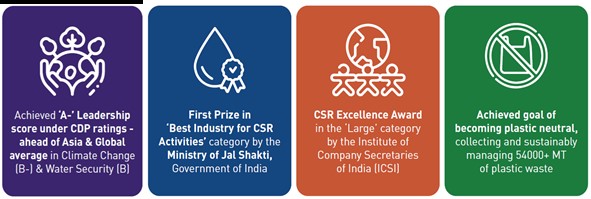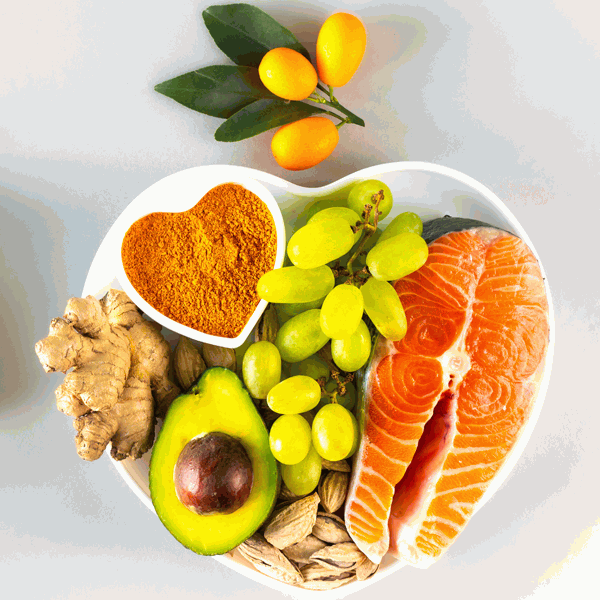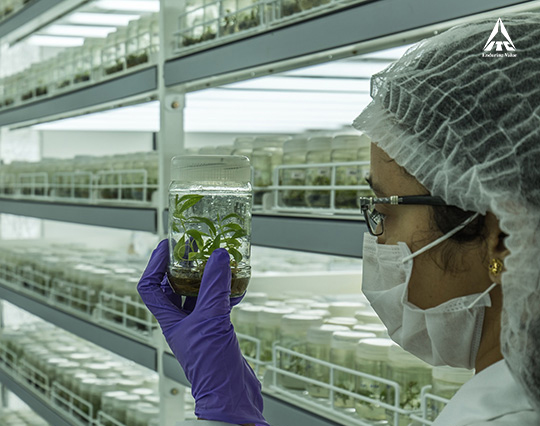Recent reports (NFHS-5, CNNS, National Nutrition strategy Booklet etc.) on India’s nutrition status have highlighted data for many public health challenges like stunting, wasting, undernutrition, anemia, obesity etc., in children under 5 years of age and other vulnerable target groups like adolescent girls, pregnant women and lactating mothers. To efficiently address these challenges, it is essential to develop a sustainable, target group-specific and a time bound strategy. ITC Foods Division's Nutrition Strategy of ‘Help India Eat Better’ has been developed to create an ecosystem and guide the organisation towards supporting the dream of a healthier nation via value-added products, responsible policies, target oriented projects and empowered people through its 4-pillar model. The strategy is in line with government initiatives such as Mission Poshan 2.0, Anemia Mukt Bharat, Kuposhan Mukt Bharat, Surakshit Matritva Abhiyan, Aspirational Districts Programme etc.
Our emphasis has been to create and nurture world-class Indian packaged food brands that enable consumers to make informed choices that are influenced by myriad factors such as taste, health, attitudes, beliefs, price, product safety and quality.
Here at ITC Foods Division, we believe all foods in their right amounts have a place in a diversified balanced diet which helps in addressing micronutrient deficiencies. In order to support national health priorities to fight against diet related diseases and in line with the dietary guidelines for Indians given by ICMR-NIN & others like WHO, ITC Foods Division's constant endeavour is to include vital nutrients such as protein, fiber, iron, zinc, vitamin A etc., and value adding ingredients like millets, whole grains, multigrain, pulses & legumes, fruits and veg, nuts & seeds, herbs and spices, dairy, egg, etc., as part of the product portfolio. Addition of the vital nutrients and nutritious food ingredients helps in addressing the key needs of discerning consumers, especially around key micro-nutrient deficiencies. This has also been captured in ITC Foods Division's Nutrition Profiling System.

As per WHO, food reformulation can contribute to ensuring access to safe and nutritious food for all, and shifting towards healthier and sustainable consumption patterns. ITC Foods Division's Product formulation & reformulation strategy is based on two principles – reduction in nutrients of concern and enhancing value added ingredients/nutrients. The strategy is driven by the guidelines, recommendations and regulations given by FSSAI and ICMR NIN. Core components of ITC Foods Division's Product formulation & reformulation strategy are:
Micronutrients include Vitamin A, Vitamin C, Vitamin D, Iron, Zinc, B Vitamin etc.
1. Certain products in Snacks, RTE (Ready to Eat), Sunfeast Farmlite, ITC Master Chef Range contains value-added ingredients like nuts, jaggery, vegetables, meat, pulses & dals etc.
2. In support of National Iodine Deficiency Disorders Control Programs (NIDDCP), ITC foods also uses iodised salt as ingredient in all our products across categories like biscuits, snacks, noodles & pasta, ready to eat foods, instant mixes, frozen snacks etc.
*Basis volume sales, unless specified
^Basis reference values as given in ITC Limited's Food Division Nutrition Profiling System (Table 4)
These commitments will continue to support ITC Foods Division's larger belief to deliver healthier food choices. This will also help business leaders to make informed decisions regarding product formulations.ITC as the leading Indian FMCG company has always strived to deliver nutritious & tasteful product options for the Indian consumers, based on many cofounding factors of varied taste preferences, targeted nutritional needs, affordability amongst many others. We believe that all foods, in right portions have a unique & critical place in a diversified, balanced diet. Consumers should be provided with a variety of food products along with appropriate nutritional information to make informed choices. In our endeavour, to provide healthier food choices, we have been using ITC FOODS DIVISION’S NUTRITION PROFILING SYSTEM. The system acknowledges the importance of enhancing diet diversity, enrichment and positive nutrition by value addition via macro & micro nutrients (critical vectors of fortification), nuts, legumes, vegetables, pulses, millets, dairy etc., along with management of reduction of nutrients of concern like added sugars, sodium, saturated fat etc in all appropriate product categories. ITC Nutrition Profiling system has been designed keeping in mind the public health needs, dietary patterns, dietary recommendations such as those issued by World Health Organization (WHO), ICMR-NIN, and FSSAI, while including the scientific rationales from other globally accepted profiling systems. Details of the profiling system is available as ITC Foods Division’s Nutrition profiling system on ITC Portal under ‘Our Policies’ ITC Nutrition Profiling system also has a comprehensive algorithm for ease of use and application.
ITC Foods Division commits to achieve 90% of its sales (relative to overall sales) from healthier portfolio basis ITC’s Food Division Nutrition Profiling System by 2025.
In 2018, ITC embarked on the journey to support FSSAI’s Eat Right India movement with a pledge to reduce the nutrients of concern in different categories, while still delivering on the taste profile of ITC Foods Division's products. This is made possible due to tremendous efforts of product development teams by using latest technology, ingredients, and research & development.
| COMMITMENT | STATUS | |
|---|---|---|
| ADDED SUGAR |
20205% reduction in current 3/4th portfolio - Biscuits & Beverages |
ACHIEVED |
2023Further 5% reduction in current 3/4th portfolio - Beverages |
ACHIEVED | |
| SALT/SODIUM |
20205% reduction in current 3/4th portfolio - Snacks & Instant Noodles |
ACHIEVED |
2023Further 5% reduction in current 3/4th portfolio - Snacks & Instant Noodles |
ACHIEVED | |
| TFA (HVO ORIGIN) | All our Food Products are "trans-fat free" on per-serving and per 100g basis | ACHIEVED |
| TOTAL FAT |
20225% reduction in current 3/4th portfolio - Snacks |
ACHIEVED |
2023Further 5% reduction in current 3/4th portfolio - Snacks |
ACHIEVED | |
| SATURATED FAT |
20225% reduction in current 3/4th portfolio - Snacks |
ACHIEVED |
2023Further 5% reduction in current 3/4 th portfolio - Snacks |
ACHIEVED |
In addition to our plan to continue reducing nutrients of concern in specific categories, our commitment of ‘100% of our product portfolio (as launched & in-market) Trans-Fat Free’ will also be taken ahead.
Sustainable food production is critical to the future of human race. This requires a systems approach to develop action-oriented roadmap to accelerate and scale inclusive innovation that meet the needs of various stakeholders. Given the multifaceted challenges in various domains, it is critical to encompass multiple vectors with specific & time bound commitments to bring a positive change. ITC has always been a game changer and a leader in the space of sustainable transformations, across its value chains. It includes responsible plastic waste management, reducing food loss & waste, providing sustainable, affordable and accessible food solutions & creating an eco-friendly value chain process.
Being a responsible leading food organisation, ITC Foods Division fully understands and supports the role of balanced diets and healthier food products that influence the nutritional and health status of the consumers by helping address the challenges of all forms of malnutrition (obesity, diet-related diseases and micronutrient deficiencies). Pricing is one of the key concerns and lesser known factors that contribute to undernutrition and micronutrient deficiencies, as many low-income consumers lack access to affordable nutritious food. Thus, providing consumers with better priced healthier product options that are easily available will naturally encourage healthy eating patterns.
ITC Foods Division Affordability & Accessibility strategy includes mapping of healthier products basis compliance with internal NPS (Nutrition Profiling System). The category specific thresholds for compliance with NPS also includes positive contribution through protein, fibre, micronutrients like vitamin A, C, D, Zinc, Iodine, iron, whole grains, fruits, vegetables, nuts, legumes etc, which cater to special nutrition needs at various life stages to address all forms of malnutrition especially amongst vulnerable population. To provide the low-income consumers a wider access to healthier and affordable food products, this strategy encompasses key vectors of:

The health of the planet is interlinked with the health of people, as climate, agriculture and nutrition are inseparable. To maintain the wellbeing of human health and achieve a sustainable and healthy food system, it is important to consciously take care of the environment. ITC supports the purpose of ‘Healthy Planet, Healthy You’ by helping reduce the carbon footprint through green and efficient manufacturing, and locally sourcing agriculture produce such as fruits for B Natural juices. The Business recently launched Plant based, Vegan- Meat alternates for consumers without compromising on taste. These have been launched under ITC Master Chef IncrEdible range of Plant based-Nuggets and Patty. Plant Protein Platform will be one of our key science & technology focus area in the coming year. ITC Foods Division also supports the production and use of traditional millets, which are known to be planet friendly.
In line with company’s nutrition strategy to Help India Eat Better and to serve its consumers and stay true to its mission, the company has put millets at the heart of its health offerings. ITC’s Mission Millets is designed as a transformative and cohesive approach to build awareness and adoption of millets and enhances both the demand and consumption as well as the production and supply aspects of this smart & nutritious crop. The Millet Mission is inspired by the company’s vision to contribute in equal measure to people, planet and profit. This vision is embedded in the company’s credo of ‘Nation First: Sab Saath Badhein.’ This approach is in consonance with the Government of India’s overall focus on nutrition and its Seven Sutras to celebrate the magical golden grain in the International Year of Millets.
Recognizing that millets are climate resilient and nutritionally superior and are critical for ensuring both food and nutrition security ‘ITC’s Mission Millets’ was launched. The initiative included development of millet-based product portfolio under its flagship brands of Aashirvaad Natures Super Foods (Ragi flour, multi millet flour), Sunfeast Farmlite Super Millets cookies amongst other products under the value-added innovation portfolio. and a dedicated Millet microsite that will host authored articles, blogs, videos and recipes that give credible information on benefits and use of Millets.
Reducing Food Loss & Waste (FLW) throughout the value chain from farm to fork, helps meet the national goals of improving access to nutrition, tackling undernutrition and food security. The Foods Business continuously works in the area of reducing food loss and waste through initiatives like improving crop productivity throughout key value chains like wheat, spices, and potato, improving efficiency, partnering with suppliers and reducing wastage at the distribution end. Appropriate labelling & consumer education via portion sizes is also an effective tool in reducing FLW.
In the dairy value chain, there is farmer-connect programme towards enhancing farm productivity and ensuring a hygienic and efficient procurement network to facilitate higher milk production. The Business continues to work towards supporting SDG Goal 12 (Responsible Consumption and Production) to “halve per capita global food waste at the retail and consumer levels and reduce food losses along production and supply chains, including post-harvest losses,” by 2030. ITC Food Division’s FLW target is aligned with the SDG 12.3 goal of reducing Food loss and waste by 50% by 2030 in our own operations. In line with these long-term targets, we have also set an interim target to reduce Foods Loss and Waste (FLW) Intensity (generation of Food related waste per tonne of production) by 30% by 2027-28 from 2018-19 baseline.
Environmental consequences of the way we produce food and manufacture food products is rising concern. Unsafe food, malnutrition and rising hunger are serious threats to global health. Loss of biodiversity, climate change, degradation of natural environment – soil, water & air quality are some of the big challenges foreseen in the coming future. Hence, to continue feeding the growing population with minimal impact on the current food systems is one of ITC's key endeavours. It needs a shared vision and multiple stakeholders to steer a positive narrative for change. ITC’s Corporate Strategy leverages the competitive advantages based on strong foundation of institutional strengths. The Company believes that when enterprises make societal value creation an integral part of their corporate strategy, powerful drivers of innovation emerge that make growth more enduring for all stakeholders. At ITC, this paradigm is called ‘Responsible Capitalism’ - an abiding strategy that focuses on extreme competitiveness but in a manner that replenishes the environment and creates sustainable livelihoods. The Company’s innovative business models synergise the building of economic, environmental and social capital, thus embedding sustainability at the core of its corporate strategy. Today, this strategy has not only contributed to building strong businesses of the future as well as a portfolio of winning world-class brands, but also in making ITC a global exemplar in ‘Triple Bottom Line’ performance. ITC’s governance, strategy and business actions are guided by its Vision, Mission and Value. Being the only of its size to be ITC’s Businesses are closely dependent on natural resources, hence conservation and restoration of natural resources, while pursuing low-carbon pathways across value-chain, is critical for sustainability of the business. Only enterprise in the world of comparable dimensions to have achieved and sustained the three key global indices of environmental sustainability of being ‘water positive’ (for 20 years), ‘carbon positive’ (for 17 years), and ‘solid waste recycling positive’ (for 15 years).
Achieved ‘Plastic Neutrality’ in FY2021-22

ITC is dedicated to playing an active role in supporting and advancing the National ambitions and priorities on climate change. To enable this, ITC is actively working towards Sustainability 2.0, an agenda which reimagines sustainability under the pressing challenges of climate change and social inequity. Sustainability 2.0 calls for inclusive strategies that can support sustainable livelihoods, pursue newer ways to fight climate change, enable the transition to a net zero economy, work towards ensuring water security for all and create an effective circular economy for post-consumer packaging waste.
ITC Foods Division Scope 1 and 2 emission reduction targets are aligned to the 1.5-degree trajectory in India, reflecting our commitment to mitigating climate change and contributing towards India’s climate goals. In addition to prioritizing our Scope 1 and Scope 2 emissions, ITC is also dedicated to addressing and reducing its Scope 3 emission. ITC’s focus has been on building capacities of our suppliers and enabling them to reduce emissions, as majority of these suppliers are small & marginal farmers as well as small & medium enterprises.
As a responsible organisation, we understand the pivotal role we play in supporting the community initiatives. In line with the national health priorities and the sustainable development goals we work towards developing a robust framework of appropriate stakeholders to develop projects that can help bring positive changes in health nutrition, livelihood and the planet at large.

Workforce including direct employees and extended workforce (procurement, supply chain partners, vendors etc.,) are one of the most important assets of any organization and supporting them in leading a healthy balanced life is essential for sustainable growth of the organization. ITC Foods Division undertakes multiple initiatives to empower them with right nutrition knowledge and provide access to various facilities to enable them to make informed choices.
ITC Foods, under its ‘Workforce Wellness Program’, has been working on various employee centric wellness initiatives and continues to review and work towards enhancing the overall health and wellbeing of its workforce, across locations. For the same some specific commitments have also been in place, namely:

In line with the commitment to support 100% employees on their journey towards leading an active and healthy lifestyle, as a first step, ITC has developed and launched a responsive and easily navigable intranet site- ITC Nutrition Portal, dedicated to Nutrition and Health for all ITC employees. The site has been specially designed for the employees and holds credible information around key fundamentals of health and nutrition in the form of modules, blogs and infographics to enhance their nutrition awareness and to encourage them to make informed food choices for themselves and their families. The interactive nutrition module creates actionable outcomes and encourages all employees to be NutriChamps.
The Government of India under its flagship Programme Poshan Abhiyaan, celebrates Rashtriya Poshan Maah i.e., National Nutrition Month every year in the month of September to encourage active participation of people to create awareness about malnutrition.
ITC celebrates National Nutrition Month to inspire its employees to make meaningful, informed choices and lead a healthier, happier life. Credible information on various nutrition topics (Balanced diet, Portion guidance, Anemia, Weight management, Vital aging, Women health etc.) are shared, and positive engagement is created through activities such as quizzes, health camps and webinars. All the employees including FTE & Non-FTE have access to these sessions that are conducted within workplace. This is followed by a third-party impact assessment for some of the sessions to ensure quality improvements. ITC will continue to engage in such national events, and guide its employees towards a nourishing and active lifestyle.

On various nutrition and health topics such as general nutrition wellbeing, nutrition in Covid, Diabetes management, Women health, management of lifestyle disorders etc., are conducted for our workforce ecosystem at head offices, factories, supply chain workers across all sites etc. Some of these programs have been independently assessed by a 3rd party for impact evaluation in terms of effective learning.
In addition to promoting employee awareness about health, nutrition, and lifestyle choices, ITC Foods also makes healthy food readily available for all employees at all workplaces (factory and office). In each of our geographic locations, there is a dedicated canteen or dining hall where one-time meals are offered daily at a subsidized rate. The mess committee controls and oversees the menu, and it regularly reviews it and solicits input for enhancement. Owing to geographic limitations and differences in culture and preferences, sometimes lunch is not always widely available in some places. To address this issue, ITC Foods Division offers allowances to ensure that healthy food is still easily accessible and affordable.
All Manufacturing units at ITC - FBD are certified by FSSAI as Eat Right Campuses. The concept of Eat Right Campus has been institutionalized by the FSSAI, Government of India under a broader ‘Eat Right India’ movement to create an environment of safe food and healthy eating in various campuses such as work places, schools, colleges, hospitals and similar places. Under this initiative, campuses are provided with a five-star rating certificate based on food safety & hygiene standards that they maintain.
Whether by focusing on serving larger national priorities, driving customer focus through cutting edge innovation or by providing our employees ample opportunities and support, ITC truly acts to manifest its ethos of ‘Sab Saath Badhein’.
All employees are given access to check weight, blood pressure, BMI etc., to maintain and manage a healthy lifestyle. Periodic nutrition related health camps such as Body Composition Analysis is organized along with nutrition counselling.
As part of the Covid response measures, the Company established partnerships with healthcare providers for home care for Covid infected employees and their family members as well as ensured 100% vaccination of employees and family members. Healthcare support is provided in terms of Unlimited medical leaves, Company paid treatment and hospitalization, in case of need.
Preventive healthcare is provided such at workplace as Vaccination drives & Periodic health check-ups as per respective age group at factories and HO along with Awareness camps at all Units and nearby areas. The health check-ups are available to all FTE & Non-FTEs at free of cost during working hours and the same is monitored by third party assessors as well. To encourage regular physical exercise, there is an onsite gym available at the ITC Foods Division head office in Bengaluru. To prevent occupational diseases and accidents, the Company creates awareness through various initiatives, ensures good ergonomics and safe practices at all its workspaces. Most of ITC units have a health centre and a resident doctor.
Maternity Leave
ITC believes in promoting the health and mental wellbeing of the new mother and her child. All female
employees at ITC are entitled to avail maternity leave as per the law of land along with additional
benefits such as extended child care leave. Details of these facilities is shared with all employees
through our ‘Flexible Work Inclusion policy’ and ‘Leave Policy’
Extended Child Care Leave
The purpose of this policy is to permit women employees extended time-off from work after child birth
/ adoption / surrogacy or subsequently as the primary caregiver, in addition to maternity leave. Women
employees who need to take a career break to devote time for child care may apply for such leave. Such
leave may be sought till the child attains the age of 10 years and is limited to 2 children. Such
leave may be availed up to 4 years, cumulatively, during service.
Care Giver Support
The purpose of this policy is to help women employees with young children undertake business travel by
supporting the accompaniment of a caregiver and child below the age of 3 years.
Paternity Leave
The purpose of this policy is to encourage an employee to take time-off and support the spouse /
partner at the time of child birth, including birth through surrogacy, or adoption. 10 days of paid paternity leave maybe availed in the first year after birth or adoption.
Same Gender Partner Medical Benefits
The policy recognizes that an employee may choose to have a Partner of the same gender and extends
coverage under the Company’s medical policy to such Partners, including up to two dependent children,
below the age of 24 years.
Supporting Breastfeeding for Mothers at workplace at ITC Foods Division
Breastfeeding is an important aspect of health for both mother and child. To address challenges faced
by the new mothers as they return to work, it is important to provide a comfortable, private space for
lactation purposes. Through its policies and initiatives, ITC Foods Division fully supports
breastfeeding mothers at workplace, and commits to providing them with facilities that will enable
them to ensure continued nursing.
We have a fully functional breastfeeding room and creche facility at HO as well as manufacturing units, wherein most manufacturing facilities are either women majority factories or ramping up their women in the workforce, with ICML Pudukkottai being the exemplar for having 75% women led workforce. Normal breaks plus earned time/leave is provided for nursing and pumping. All the facilities are accessible at free of cost for all the women employees of ITC Foods Division.
ITC Foods Division ensures availability of online nutritional information for all its packs on various platforms like ITCstore, Brand websites or E-commerce stores. ITC Foods Division will further enhance its communication with consumers through web portals and share credible science-based information.
With growing digital footprint and as more and more consumers access the digital space, ITC has worked towards enhancing its ITCstore interface, and has introduced a user-friendly, dedicated tab- Nutricorner, to provide easy to understand information on nutritional properties of food products like goodness of protein, fiber, millets, vitamins and minerals.
To help our consumers make informed choices and deepen their knowledge on nutrition and wellbeing. ITC has created a dedicated Nutrition portal which is an easily navigable site that holds credible information on Nutrition basics, health and lifestyle management and general wellbeing.
ITC Foods Division as part of it's Nutrition Strategy and enabling certain actions require a overall approach of responsible & transparent communication both internally and externally. Certain vectors have a direct and deep impact on the organisation’s objectives.
Knowing portion sizes is important to plan a day’s balanced diet. In line with this and the Company’s belief to provide transparent communication to consumers to help them make informed choices, ITC Foods Division had initiated the incorporation of serve size and number of servings on all packs, in full compliance to food regulations from an early stage. Besides this, ITC Foods Division also supports other ways to help consumer understand portion recommendation and do mindful eating like individually wrapped portions, resealable packs (bottles with caps), discrete units, demarcations on products, has been adopted across different products under Farmlite, Dark Fantasy, Fabelle & Jelimals range.
We have already initiated front of- pack labelling for nutrients of concerns in select products like Farmlite oats almond, Aashirvaad vermicelli, Aashirvaad multigrain flour, and Ready-To-Cook chapati long before regulation comes into place, which is a mark of any responsible organisation.
Human diet and nutritional needs are constantly evolving. In the context of the new era of health and wellness propagated by Covid-19 pandemic, ITC LSTC has taken up concrete projects to deliver not only tasteful but science-based healthy products. State-of the- art research along with ITC’s outreach from farm to fork has been leveraged to deliver differentiated and nutritionally sound products. ITC Foods was the first company to launch juices with a clinically proven ingredient to support immunity. ITC Foods Division is working on emerging research areas like gut health, nutraceuticals, vital ageing and millets, especially as per the needs of Indians, to make nutritious choices available for them.

With the dynamic regulatory and socio-economic environment, it is critical to understand, evaluate and design appropriate strategies to minimize risks that can impact the nutrition outcomes for any responsible organisation. ITC Foods Division maps risk and opportunities related to nutrition that can impact the business and hamper the progress made so far. The business risks associated with nutrition are reviewed periodically by ITC Foods Divisional Management Committee. They are further classified under Top risks and along with clear indicators & time bound corrective actions are mapped. Some of these are then reviewed by the Corporate committee at the top, as part of board reviews.
As a diversified enterprise, ITC continues to focus on a system-based approach to business risk management. Management of risk has always been an integral part of ITC’s ‘Strategy of Organisation’ and straddles its planning, execution and reporting processes and systems, which is backed by strong internal control systems. The top 10 corporate risks are clearly defined and published in our Sustainability & Integrated Report. ITC Foods Division endeavours to continually sharpen its Risk Management systems and processes in line with a rapidly changing business environment and evaluates the top risks pertaining to areas of concern. The risk pertaining to nutrition aspect of the Division’s product portfolio are also part of the risk library which are mapped and evaluated for their impacts at regular intervals by the Divisional Management Committee of Foods Division, as listed below:
While developing healthier product portfolio it is essential to also continuously map and evaluate its reach and affordability. At ITC Foods Division we responsibly commit to work towards providing product options which are accessible, affordable and healthier. This is reviewed internally by appropriate stakeholders with specific outcomes being recognized and integrated while devising commercial sales strategy. This also helps us to set specific and time bound targets to continuously work towards this objective.
As a leading food industry, ITC Foods Division understands the importance of responsible communication to its consumers across various platforms & thus has a responsible marketing policy which includes principles and commitments for general audience and specific for children. The policy is subject to annual internal audit and a 3rd party independent audit. Full details of the principles are covered in the policy ITC Limited’s Foods Division Marketing and Communication Policy which is available at ITC’s website for transparent communication with consumers and stakeholders.
ITC Foods Division's Nutrition strategy ‘Help India Eat Better’ is approved and reviewed by the
board for its implementation. The details of the progress of this strategy are also captured in the
annual Integrated & Sustainability report. The strategy is extremely critical for the organisation
and hence the accountability of the same lies with Head of Nutrition and Chief Operating Officer (member of the Foods Division’s Divisional Management Committee). This is reviewed at various levels (Divisional Head & Managing Director). Given the criticality of both the area and
the deliverables, the outcomes of the strategy are directly linked with the above mentioned stakeholders (Head of Nutrition and COO)
annual review for ratings & remunerations.
ITC Foods Division’s Nutrition strategy has also been mentioned as part of the ‘Performance highlights’ under Company’s official media statement for the Standalone Financial Results for the Quarter and Year ended 31st March, 2023.
The ITC Foods Division's nutrition plan and strategy undergo annual internal review by senior management and is also audited internally to check for compliance. Marketing and communications policy of ITC Foods Division is subject to an annual internal and external audit.
ITC Foods Division believes that responsible engagement with appropriate stakeholders for
appropriate nutrition and public health topics is essential for an organisation to contribute
positively towards national nutritional priorities. In line with this, ITC Foods has
'ITC
Limited’s Foods Divisions Nutrition and Public Health Engagement Policy' which defines the
governing principles for all employees and third party stakeholders. This is in line with
ITC’s Core Values, ITC’s Code of Conduct and ITC’s policy on Responsible Advocacy.
ITC Limited as a responsible organisation engages with/through many trade associations.
However, ITC Foods Division actively leads engagement with/through various trade
associations on nutrition related areas along with other appropriate internal stakeholders.
These associations facilitate active participation in latest discussions pertaining to nutrition
and other related topics.
Through its annual statutory reports like Sustainability & Integrated Report, ITC Report & Accounts, the company shares its commitments with its stakeholders regularly.